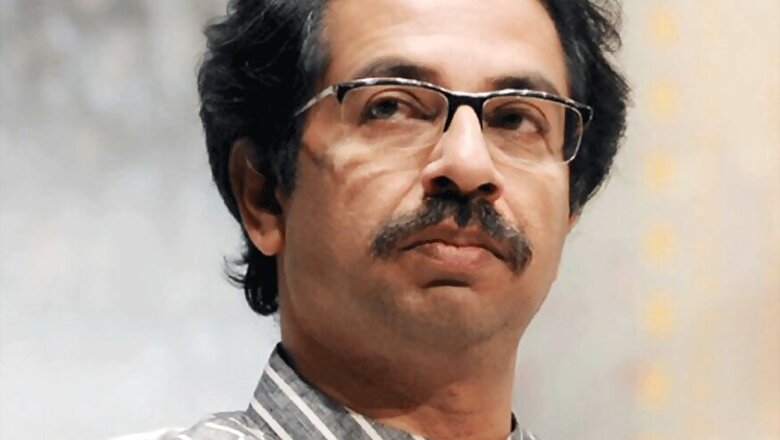
views
The Shiv Sena's decision to break the 29-year-old alliance with the BJP by contesting the next year's Lok Sabha and Assembly polls in Maharashtra is a turning point in politics of the state.
The Shiv Sena-BJP alliance had some 25 years back, in 1995 to be exact, ended the one party rule of the Congress in the state and had created a Hindutva vote bank by attracting OBCs, lower and urban middle class and youth.
Maharashtra, once the stronghold of the Congress party, has been witnessing coalition governments since then without a break because of the coming together of Shiv Sena and the BJP that also marginalised smaller parties like the Janata Party, Janata Dal, Peasants and Workers Party, RPI factions and the Left.
A sulking Shiv Sena has played the political gamble after increasingly and painfully realising that it is the real target of a resurgent BJP and not the Congress nor the Sharad Pawar led NCP. In fact, the party founded by the late Bal Thackeray half a century ago, has become the main hurdle in BJP's expansion. The Shiv Sena-BJP had fought the 2014 Lok Sabha elections together and brought down the Congress’ tally to just two seats. But the success, on the back of the Narendra Modi wave, led to breaking of the alliance in the Maharashtra Assembly polls held after four to five months (October 2014).
The BJP under the leadership of Narendra Modi-Amit Shah, bluntly conveyed to the Uddhav Thackeray led Shiv Sena that either it should accept a secondary position or quit. Although the Shiv Sena did not quit the NDA at the Centre,it faught the Assembly elections against the BJP and joined the Devendra Fadnavis’s government only after it had proved the majority in the Assembly without the Shiv Sena. The BJP performed credibly by over 120 seats in a 288-Member House while Sena tally was just 60 plus.
After that the BJP high command had rejected the Shiv Sena's demand of a deputy chief minister, Speakar's post and plum ministries. It had fielded candidates against the Shiv Sena in the BrihanMumbai Municipal Corporation elections and got the space that Modi-Shah had been wanting desperately.
Now, the real issue is whether the Shiv Sena will survive in the bitter tussle against the BJP which is using every trick in the trade to marginalise it in the past three years. On the other hand, there is the challenge from the Congress and the NCP. The Shiv Sena’s planned departure from the NDA, will bring the Congress and the NCP closer.
In fact, the talk of re-alliance have already begun in the two parties. "If we fight the elections together, we can win 35 of the total 48 Lok Sabha seats," said a former Maharashtra Congress chief minister a few weeks ago.
"Maratha-Dalit-Minorities" have been the Congress-NCP's "winning combination". Sharad Pawar is the tallest leader of the state who is acceptable to not only to the Congress but a section of the Shiv Sena as well.
"Our target is to ensure that the BJP does not cross 12 Lok Sabha seats," a Shiv Sena leader privately said during the winter session of parliament.
While the Shiv Sena does not have a 'face' in Vidarbha, the BJP-RSS’s pro-Vidarbha state demand could work against it in Western Maharashtra, Marathawada, north Maharashtra and even in Konkan regions.
The BJP believes that the Modi magic could work once again in both the Lok Sabha and the Maharashtra Assembly elections in 2019. Chief Minister Fadnavis has been indicating of advancing the state Assembly polls and holding it together with the Lok Sabha elections.
A split in the Hidutva vote bank would be a game changer in the state witnessing rapid urbanisation, growing unemployment, assertions of Marathas and Dalits besides farmers’ suicides. Although the BJP would be the common target of the Congress, NCP and the Shiv Sena in the coming electoral battle it is unclear whether the three parties would work on a common strategy. The BJP has been lacking credible allies in the state. While Raju Shetti of the Swabhimani Paksha has already quit the NDA on farmer issues, Union minister Ramdas Athavale of the RPI(A) is unpredictable. The Maharashtra Navniram Sena chief Raj Thackeray has turned into a bitter critic of Narendra Modi and Amit Shah.
The BJP might have won local body elections, emerged stronger in some municipal corporations, but would find it difficult to face the next electoral challenge under the leadership of Fadnavis, Nitin Gadkari, Chandrakant Patil, Pankaja Munde and Vinod Tawde.
(The author is a senior journalist)




















Comments
0 comment